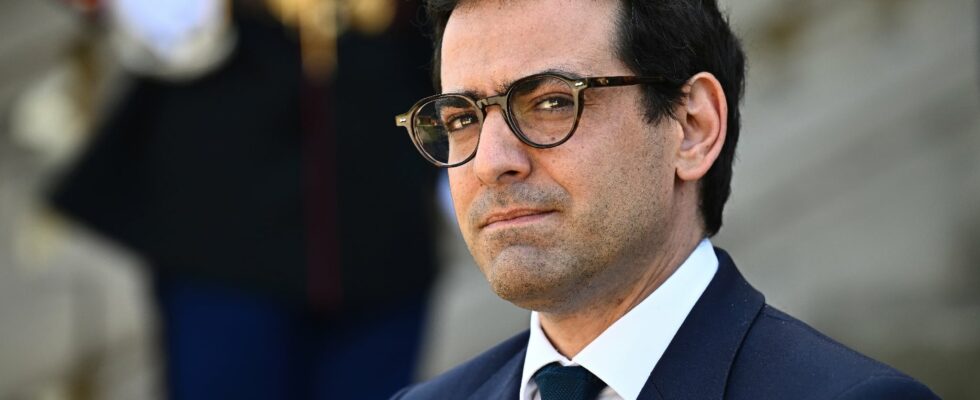Rarely has the announcement of the composition of the European Commission been preceded by such twists and turns! Just 24 hours before Ursula von der Leyen’s meeting with the European Parliament, the last-minute replacement of Thierry Breton by Stéphane Séjourné as France’s designated candidate had the effect of a dramatic turn of events in Brussels. This episode, already unprecedented in itself, was added to the Slovenian saga, responsible for the postponement of the distribution of portfolios by a week. Moreover, Prime Minister Robert Golob, under pressure from his opposition, had still not formalized the candidacy of diplomat Marta Kos as of late Monday afternoon, September 16.
Barring any last-minute changes, the Commission President seems determined to reveal who will do what as early as Tuesday, September 17. By obtaining the ouster of the powerful outgoing French Commissioner, the German conservative has shown that she wants to impose her mark more on her team, even if she failed to obtain a gender balance. If she does not choose the candidates proposed by the Member States, the German can decide what scope of responsibility she entrusts to them.
“The priority is the portfolio and we needed a personality who had the confidence of both presidents to carry it,” explains Emmanuel Macron’s entourage to justify the European landing of the Minister of Foreign Affairs. Even if the European Commission politely puts forward the same explanation word for word, the bad relations between Ursula von der Leyen and Thierry Breton were public knowledge. On several occasions, the head of the internal market and digital technology openly stood up to his boss or acted without consulting her. His head was the price to pay by Paris to secure the coveted responsibilities.
Stayed, how many officials?
According to the Elysée, Stéphane Séjourné should become the executive vice-president in charge of “the issues of industrial, technological sovereignty and European competitiveness” dear to Emmanuel Macron and deemed crucial by Mario Draghi in his recent report. He should lead a “cluster”, a group of four commissioners (Innovation and research, trade and economic security, economic and financial affairs, financial services and capital markets union). Defense, on the other hand, would not be part of it. The former head of the centrist group in the European Parliament will only be able to rely on a single directorate-general, that of industry and the internal market (the “DG Grow” in Brussels jargon) which should nevertheless be strengthened, while Thierry Breton, himself, oversaw three during the previous mandate. In Brussels, real power depends on the number of battalions of civil servants you control…
By choosing Stéphane Séjourné, the Elysée is also banking on a more political personality, likely to play an active coordinating role in the three-party coalition that supports Ursula von der Leyen. In a very fragmented European Parliament where three far-right groups now coexist, the conservatives of the EPP, the social democrats of the SD and the liberal centrists of Renew constitute the pillars of its majority. As such, each should therefore receive at least one executive vice-presidency and lead one of the major priorities of the years to come. The Latvian EPP Valdis Dombrovskis, a heavyweight in the outgoing team, will oversee issues related to the enlargement and reconstruction of Ukraine. The Spanish minister Teresa Ribera will coordinate issues related to transitions, first and foremost the climate, but probably also digital technology. Another socialist, the Slovak Maros Sefcovic, – who is starting his fourth term! – could also obtain a “VP-E” position and would be entrusted, among other things, with the much-awaited simplification of European regulations.
Meloni’s Good Graces
Finally, “in the name of the weight of Italy” and to curry favor with Giorgia Meloni, Raffaele Fitto, member of the Fratelli d’Italia and Minister of European Affairs, should also be given broad responsibilities and manage cohesion, the economy and the money of the post-Covid recovery plan. A prospect against which the left and the center have already spoken out, but which reflects the shift to the right in European political life.
In total, no fewer than 14 European Commissioners will come from the ranks of the EPP among the next tenants of the Berlaymont. The conservatives should obtain the important portfolios of the budget (intended for the Polish Piotr Serafin, close to Prime Minister Donald Tusk), defense, energy and agriculture. The Belgian liberal Hadja Lahbib seemed, for her part, earmarked for the migration portfolio.
After the already eventful stage of nominations, all candidates for a European mandate will still have to pass a three-hour oral exam in front of MEPs, a difficult exercise in which three candidates (including the Frenchwoman Sylvie Goulard) failed in 2019. We cannot therefore rule out further twists and turns.
.
